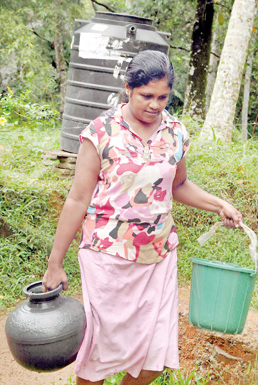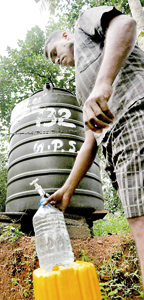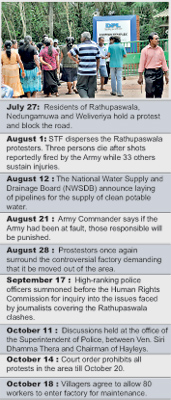News
Rathupaswala water crisis and new moves to dam it
Almost three months after the Rathupaswala’s people power protest in demand of clean drinking water was crushed by the Army shooting in which three people died, uncertainty and intrigue still loom large — with the official test reports yet to be made public.

Although the tense situation has somewhat subsided, the affected residents are still awaiting a solution from the government to the water crisis. Many residents get their drinking water from a number of black plastic tanks provided by the Gampaha and Mahara Pradeshiya Sabha but complain that the supplies do not last even a day.
V. Indrani, 58, a mother of one from Nedungamuwa said there were times that the tanks were not replenished for a week and that they had to go to the nearest village looking for water.
“We go through many hardships to get some drinking water and this has become an added burden on us,” said Indrani claiming that they have stopped taking water from their well because health officials who tested the water have said it was not suitable for consumption.
“We are not even sure that the water provided by the Pradeshiya Sabha is clean. Some villagers said that they found a type of moss in it and since then we boil the water before drinking,” she said as she left home with a bucket to fetch some water for the next morning.
Another woman, T. M. G. Cooray, 43, a mother of two, said the water crisis had hit them hard and brought in its wake more problems. “We drank from our wells and bathed here. Now the women have to walk several kilometres each day to get water,” she said.
As a solution to the water crisis, which the villagers have attributed to the effluent from a glove factory that met 5 per cent of the world demand for non-surgical rubber gloves, the Government proposed to provide pipe-borne water to the affected households in the Rathupaswala area. But the proposal did not make much ground because a majority of the residents refused to pay the connection fee charged by the Water Board. They refused to pay on the grounds that they had spent more than Rs. 100,000 to build their wells which now contain contaminated water for no fault of theirs.

Villagers complain that the water supplied from these tanks do not even last a day. Pix by Indika Handuwala
“To pay for water?” asked an angry M. M. D. Kumari, 40, mother of one. “Why should we pay for water which was freely available for us? It was not us who asked for a factory here,” she added. Some villagers claim that the quality of water in the village wells has improved after the factory remained closed for a couple of months following the protests and the violence.
M. Nandasiri, 48, from Uruwela said that he even dared to taste the water and the sour taste that forced them to abandon the wells was not as pungent as it was before. He said the villagers strongly believed that if the factory was shifted from the area, the water quality would improve.
Nandasiri said the villagers said they were fighting for water in the interest of the children of the village. Meanwhile, in a dramatic twist to the Rathupaswala water saga, Ven. Theripaha Siridhamma Thera who had spearheaded the protest campaign has left the village unannounced, giving rise to questions whether he had been bought over.
Ven. Liyanwela Dhamma Thera who is now in charge of the Sri Sambuddha Jayanthi Viharaya said Ven. Siridhamma Thera had gone to Gampala to attend a funeral and fallen ill and he would return in a few days.
But the villagers are not convinced. “We suspect that the monk has been paid to lie low. He has deserted us and we do not want him anymore,” said Nandasiri, vowing to continue to campaign with or without the support of the so-called activists.
Joining the campaign is a group calling itself the ‘Siyane Jalaya Surakeeme Jana Neguma’. Its main convener, Mahara Pradeshiya Sabha UNP Member Pramitha Hettiarachchi, blamed government agencies for the plight of the villagers.
“People have died or fallen sick because of the toxic substances emitted from the factory. The toxic waste that had seeped into the paddy fields had killed eight farmers. Doctors had said that they died of rat fever but the villagers knew right along it was the toxic waste that was responsible for these deaths,” he said.
Mr. Hettiarachchi accused the factory of showing little concern to the health and welfare of the village. He said the problems the people had with the factory had a long history and were not confined to water alone. Soon after the factory was set up the power supply for the households dimmed because much of the electricity was diverted to the factory. It was only after complaints that the factory started using generators.
He also said the factory was responsible for the destruction of trees in the area as it had collected 20,000 kilos of wood by felling them. Besides, the factory consumed 60,000 litres of water every day, he said adding that much of this water returned to the ecosystem as industrial waste, causing serious pollution to the environment.

Mr. Hettiarachchi said that more and more people were falling ill due to the contaminated water. In addition to the health problems, the villagers were also hit economically because the land value of the area had drastically fallen, the activist said.
He vowed to bring in foreign experts to do tests on the water if the government failed to do a proper and credible test. Mr. Hettiarachchi said many residents had been threatened to give up their fight and drop the legal cases against the factory or silenced through bribes.
Mahesha Ranasoma, Managing Director of Dipped Products PLC, which runs the factory, told the Sunday Times that it was wrong to believe that the factory was responsible for the low-PH value in the water.
“An analyst of the Water Board had given a report to the people saying that the water had a low PH value and it was not suitable for drinking. People got agitated as a result of this. The factory is not responsible for the low PH value in any way,” he said.
Dr. Ranasoma said that as a result of the protests, the factory had to stop production, causing a big revenue loss to the country. “The work in the factory is halted completely and we are losing many buyers because of this. This has an impact on the country. We tried to explain this to the people, but we failed to get the message across,” he said.
Dr. Ranasoma said the company would continue with its moves to sort out the crisis after the test reports from research bodies were made public. When asked about the relocation of the factory to the free-trade zone in Biyagama, Dr. Ranasoma said this could not be done overnight as there was process to follow.
He said that since the machines should be operated from time to time they informed the police that some workers should be allowed to enter the factory. An agreement was reached with a village committee headed by Siridhamma Thera.
But the move was abandoned when the villagers protested.
Meanwhile, in a compromise move, the factory has agreed to pay pipe-borne water connection charges on behalf of 3,000 families. Whether the villagers will accept the deal is still not known. As the water crisis continues, the answer to the question what’s next in Rathupaswala will be known only after the results of the tests carried out by various state research agencies are made public.
Villagers agree to allow 50 workers for maintenance at Weliweriya factory
Villagers on Friday agreed to allow 50 workers for maintenance work in the factory in Rathupaswala, Weliweriya.
This was agreed following a meeting presided by Superintendent of Police (SP) D. Komasaru, at a cemetery in the vicinity of Ratupaswala Sivali Vidyalaya.
The meeting was organised following discussions with Deputy Inspector General of Police (DIG) Anura Senanayake where it was agreed to allow 80 workers into the factory. However, the villagers protested when the police tried to take a sand truck into the factory.
At the gathering on Friday, SP Komasaru explained that if maintenance work on the machinery is not carried out, the problem will be aggravated. He said that, as there are substances unattended to within the factory, it would be unsafe.
When the SP suggested that these substances must be removed, the villagers insisted that the vehicles used must be thoroughly examined. They feared that factory officials would commence work. In response to this, SP Komasaru said that four villagers could go in and check the factory. -Deepa Adikari
The ritual was to ward off bad effects in my horoscope, says monk

The chief monk stands besides one of the damaged vehicles
In a separate incident, the Uruwela Sabha Temple in Nedungamuwa, Uruwela, was attacked by a group of villagers on receiving a tip-off that the chief incumbent was performing an animal sacrifice ritual on behalf of the factory last Friday (October 11).
They had entered the temple during the ritual at midnight, and attacked those present, while also causing damage to property, several vehicles and the temple. Four women were among the 17 people arrested and enlarged on bail for their alleged involvement in the attack.
“There weren’t any factory staff present that day. In fact, the ritual was on my behalf, because my horoscope said I was in grave danger,” Ven Yagoda Siwali Thera said. He said that a hen was brought because the ritual required its blood for its completion. “This agitated some villagers, who came crashing into the temple. They caused damage to my Benz and other vehicles,” he added.
Recalling the incident, he said, one person, ‘Tommy’, grabbed his neck and threatened him. “The others were armed with wooden poles. They broke everything they could lay their hands on and set fire to some of my documents. It was around 2 a.m when the police came,” he said.
The arrests were made the following day. “There are many others who haven’t been identified. I saw at least 75 people in the temple premises itself. It is not surprising that police shot at these people during the protest. They were armed and attacked the police. I would have done what the police if I was armed too,” he said
Ven. Yagoda Siwali Thera is a member of the Mahara Pradeshiya Sabha and a member of the Jathika Hela Urumaya.
comments powered by Disqus
